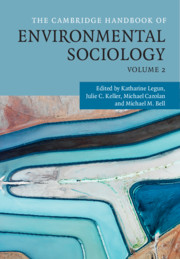Book contents
- The Cambridge Handbook of Environmental Sociology Volume 2
- The Cambridge Handbook of Environmental Sociology
- Copyright page
- Contents
- Figures
- Tables
- Contributors
- Foreword
- Introduction
- Part I Methods
- Part II Embodied Environmental Sociology
- Part III Beyond the Human
- Part IV Sustainability and Climate Change
- Part V Resources
- 18 Enclosing Water: Privatization, Commodification, and Access
- 19 Speech Is Silver, Silence Is Gold in the Fracking Zone
- 20 Environmental Sociology and the Genomic Revolution
- 21 The Future Is Co-Managed: Promises and Problems of Collaborative Governance of Natural Resources
- Part VI Food and Agriculture
- Part VII Social Movements
- Index
- References
19 - Speech Is Silver, Silence Is Gold in the Fracking Zone
from Part V - Resources
Published online by Cambridge University Press: 05 November 2020
- The Cambridge Handbook of Environmental Sociology Volume 2
- The Cambridge Handbook of Environmental Sociology
- Copyright page
- Contents
- Figures
- Tables
- Contributors
- Foreword
- Introduction
- Part I Methods
- Part II Embodied Environmental Sociology
- Part III Beyond the Human
- Part IV Sustainability and Climate Change
- Part V Resources
- 18 Enclosing Water: Privatization, Commodification, and Access
- 19 Speech Is Silver, Silence Is Gold in the Fracking Zone
- 20 Environmental Sociology and the Genomic Revolution
- 21 The Future Is Co-Managed: Promises and Problems of Collaborative Governance of Natural Resources
- Part VI Food and Agriculture
- Part VII Social Movements
- Index
- References
Summary
This chapter discusses the critical role of discourse in politics, highlighting the benefits to development advocates that accrue when the voices of concerned citizens are silenced. Seeking consent for industrial development has always been a game of claimsmaking, involving what Sheila Jasanoff refers to as “sociotechnical imaginaries” designed to solicit endorsement for particular development pathways. But behind the curtain of overt claimsmaking lay efforts to keep certain claims out of the limelight, when those claims may be perceived as particularly threatening to development. Davidson explores the manifold strategies employed by development advocates to silence concerned rural residents in southern Alberta, where natural gas reserves are being extracted through hydraulic fracturing, a technique associated with a host of environmental, climate, and health risks.
- Type
- Chapter
- Information
- The Cambridge Handbook of Environmental Sociology , pp. 324 - 341Publisher: Cambridge University PressPrint publication year: 2020

